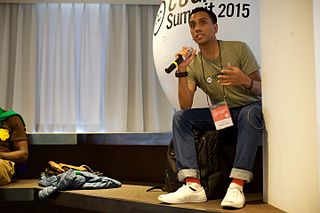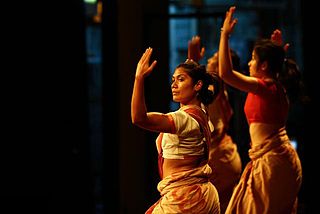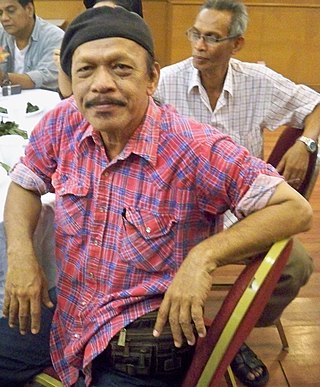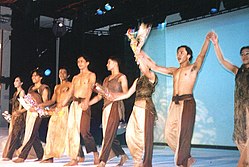
Syed Muhammad al Naquib bin Ali al-Attas is a Malaysian Muslim philosopher. He is one of the few contemporary scholars who is thoroughly rooted in the traditional Islamic sciences and studies theology, philosophy, metaphysics, history, and literature. He pioneered the concept of Islamisation of knowledge. Al-Attas' philosophy and methodology of education have one goal: Islamisation of the mind, body and soul and its effects on the personal and collective life on Muslims as well as others, including the spiritual and physical non-human environment.

Zapin is one of the most popular dance and musical forms in traditional Malay performing arts. Dance movements are choreographed to melodies which are performed using musical instruments such as the gambus, accordion and rebana. It is believed to have been introduced by Persian and Arab Muslim missionaries from the Middle East to Malay Archipelago around the fourteenth century where back then only males were allowed to perform; nowadays, female dancers are included. It used to be performed exclusively for religious ceremonies but through the years it has become a form of traditional entertainment, hence the participation of female dancers is allowed.

The culture of Malaysia draws on the varied cultures of the different people of Malaysia. The first people to live in the area were indigenous tribes that still remain; they were followed by the Malays, who moved there from mainland Asia in ancient times. Chinese and Indian cultural influences made their mark when trade began with those countries, and increased with immigration to Malaysia. Other cultures that heavily influenced that of Malaysia include Persian, Arabic and British. The many different ethnicities that currently exist in Malaysia have their own unique and distinctive cultural identities, with some crossover.
Rosalind Newman is veteran choreographer who has created a body of over 70 works.
Dance in Singapore has been an integral part of its culture despite having a relatively short history of creative, artistic and professional dance. The range of dance reflects the cultural diversity of Singapore, from traditional dance forms to contemporary genres.

Ungku Abdul Aziz bin Ungku Abdul Hamid was a Malaysian economist and lecturer. He was the 3rd Vice-Chancellor of the University of Malaya from 1968 to 1988 and the 1st General Director of the Council on Language and Literature of Malaysia from 1956 until 1957. He was awarded the title of Royal Professor in 1978.

Kesatuan Melayu Muda (KMM) was the first leftist and national political establishment in British Malaya. Founded by Ibrahim Yaacob and Ishak Haji Muhammad, KMM grew into a prominent pre-war nationalist movement, notable for its leftist political stance and willingness to use violence, a sharp break with their contemporaries in the Malay nationalist movement.

Sha'ari bin Tadin was a Singaporean politician who was the first Member of Parliament (MP) of Malay descent who graduated from a university. He was highly regarded as Cikgu Sha'ari, which translate to "Teacher Sha'ari" in English, for his role as an educator.
The Singapore Ballet is Singapore's national dance company, founded in 1988 by Anthony Then and Goh Soo Khim. The Artistic Director of the company is Janek Schergen.

Abdul Muid bin Abdul Latif was a Malaysian-based web designer, graphic designer and digital artist, who is known for promoting the cultural elements of the Southeast Asia from Batik and Songket into his commercial works and artworks.
Goh Soo Khim is a Singaporean ballerina and a doyen in Singapore’s dance scene. She is also the co-founder and artistic director of Singapore Dance Theatre. She is also credited for the development of ballet in Singapore, and for nurturing many successful dancers under her tutelage, to become successful dancers, soloists and even choreographers over the years.
Dr. M. K. Rajakumar was a Malaysian doctor and socialist politician. As a doctor, he was a pioneer of the discipline of Family Medicine by general practitioners in Malaysia. As a leftist intellectual he was among the leaders of the Labour Party of Malaya and Barisan Sosialis in the 1960s, helping to build the Labour Party alongside Tan Chee Khoon, V. David and Ishak Haji Muhammad.

The Nusantara Society is a Russian non-profit learned society for research fellows, professors, lecturers, students and postgraduates of Moscow and St. Petersburg academic institutions, universities and higher schools, studying the vast region of Nusantara, populated by peoples speaking Austronesian languages. Nusantara includes Brunei Darussalam, Indonesia, Malaysia, Philippines, Timor Leste, Madagascar, Oceania, as well as countries where Austronesian minorities are present, such as Singapore, Thailand, Vietnam and Taiwan.
Mavin Khoo is Malaysian dancer of the Indian classical dance form, Bharata Natyam.

Malaysian Indians or Indian Malaysians are Malaysian citizens of Indian or South Asian ancestry. They now form the third-largest group in Malaysia, after the Malays and the Chinese. Most are descendants of those who migrated from India to British Malaya from the early 19th to the mid-20th centuries.
Ghulam-Sarwar Yousof was a Malaysian academic and writer. He was an expert in traditional Malay and South-East Asian theatre as well as one of the leading writers of Malaysian English Literature.

Victor A. Pogadaev is a Russian historian, orientalist, and translator. He specializes in the history and culture of South-East Asia and translates literary works from Malay and Indonesian into Russian and vice versa. He is also a noted lexicographer.

Dinsman is a Malaysian poet, playwright and theatre practitioner. Dinsman is his penname, his real name being Che Shamsudin Osman.

Khalid bin Salleh was a Malaysian actor and poet.
Shafirul Azmi bin Suhaimi Jawi شافيرول عزمي سوهايمي is a Malaysian citizen born in Sabah. He is one of the famous contemporary dance choreographers in the country. The basis of his dance moves was greatly influenced by the martial arts called Silat, a gesture of Sabah and Sarawak traditions that made his choreography very unique and interesting. In addition, he has often adopted site-specific, post-modern ideologies in his work.













